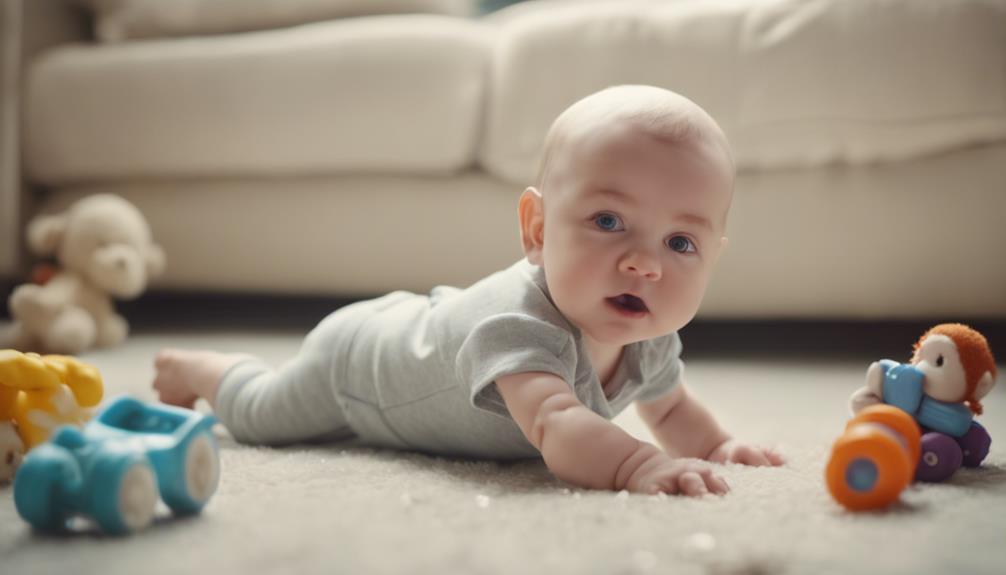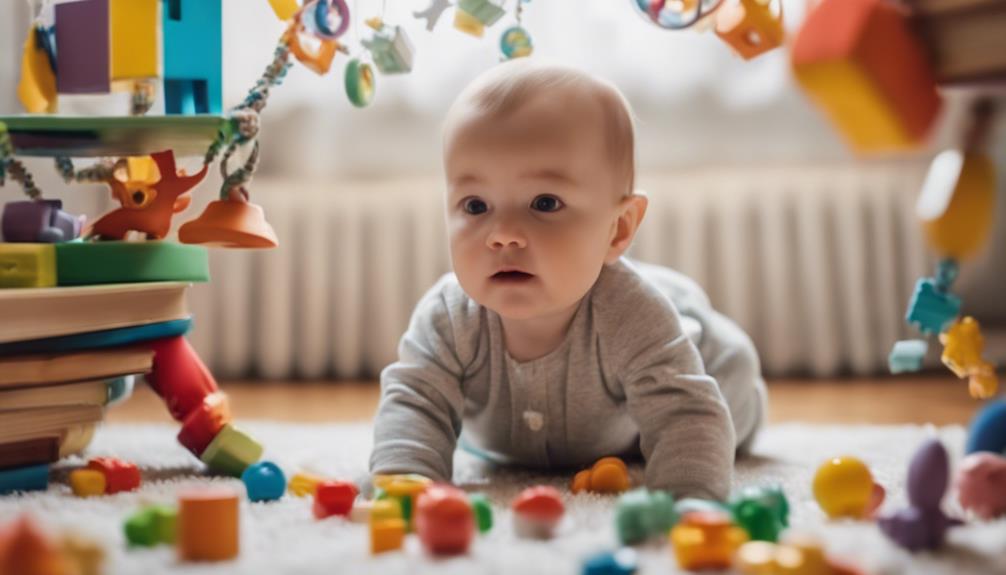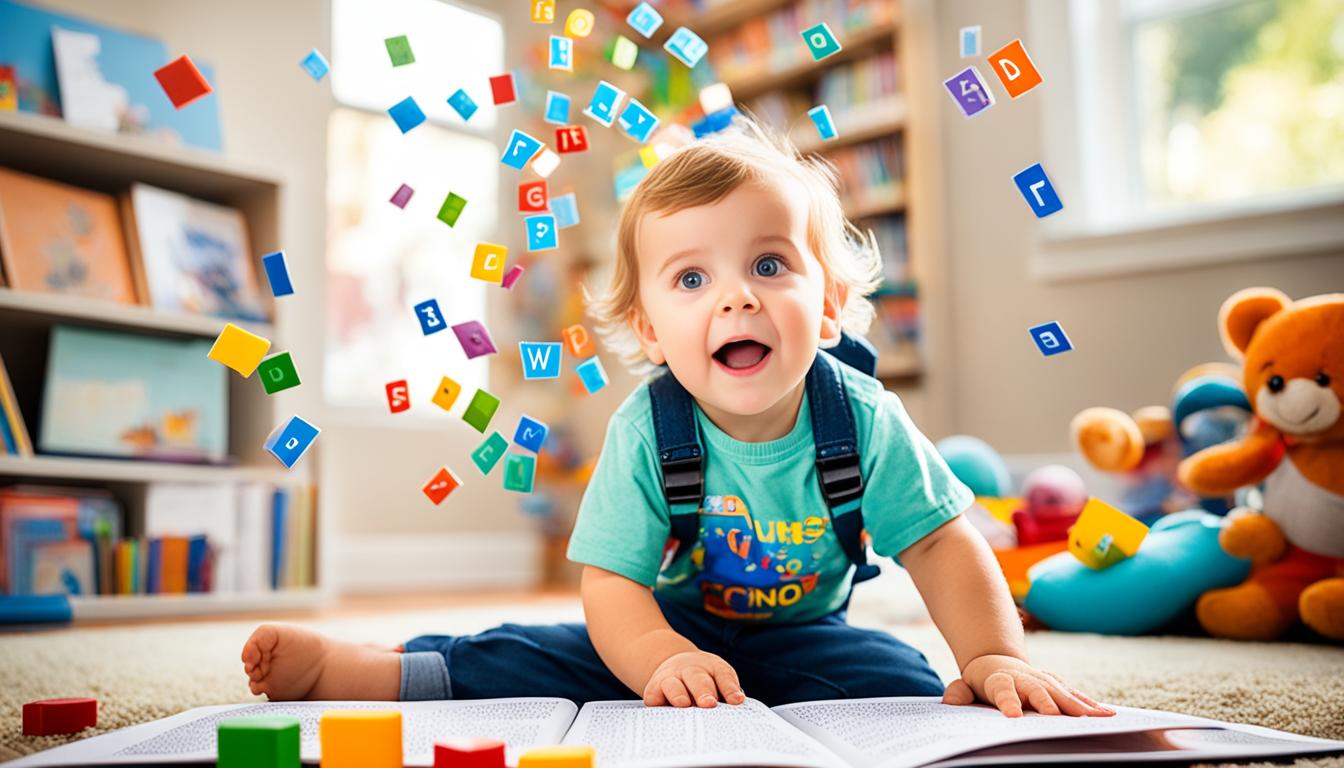Understanding your baby’s motor development is crucial for their growth. Milestones like rolling over, pushing up, and sitting with support are key. These actions build strength and coordination. Smiling and cooing mark social-emotional progress. As your baby explores, crawling and walking lead to independence. Over time, these skills develop into running and advanced movements. This process enhances motor skills and physical abilities, nurturing overall growth. Foot massagers can aid in relaxation and circulation. By understanding these milestones, you’re supporting your baby’s development. Discover more about helping your little one thrive.
Key Takeaways
- Encourage tummy time for muscle growth and strength.
- Support rolling over and sitting milestones.
- Engage in interactive play to promote sensory and cognitive skills.
- Provide safe environments for early walking and running practice.
- Progress to advanced skills like jumping and sports for complete physical development.
Early Infancy Motor Milestones
What're the key motor milestones that babies typically achieve during early infancy?
Your child's growth and development in early infancy involve significant motor milestones. From rolling over to reaching for objects, these activities are important indicators of their physical progress. You may observe your baby beginning to sit with support, a notable achievement that showcases their strengthening muscles and coordination.
During this stage, sensory development plays a crucial role in your child's growth. Engaging with colorful toys, music, and face-to-face interactions are essential for stimulating their senses. These interactions not only promote sensory awareness but also encourage cognitive growth.
Emotional milestones are also significant during early infancy. Your baby may start recognizing and responding to emotions displayed by caregivers, laying the foundation for healthy emotional development.
Additionally, cognitive growth becomes apparent as your baby starts tracking objects with their eyes, displaying signs of curiosity and awareness. These early motor milestones are exciting markers of your child's progress in their early stages of life.
Smiling and Cooing Development
Around 6-8 weeks, babies start to smile as a way to engage socially.
Cooing, which begins at 2-4 months, helps them communicate with you.
These early milestones are vital for building connections and laying the groundwork for further interactions.
Smiling Milestones
By around 6-8 weeks, babies typically begin to smile in response to stimuli such as faces or sounds, marking an important social milestone in their developmental journey. This significant step showcases your child's developing ability to communicate and connect with others.
The emergence of smiling is closely tied to your baby's growing capacity to understand and react to emotions in their environment. As your little one flashes those adorable grins, they often accompany them with delightful cooing sounds, laying the groundwork for early language development.
Encouraging these smiles can be as simple as engaging in fun interactions and maintaining eye contact with your baby. These interactions not only foster a strong bond between you and your child but also support their growing communication skills.
Cooing Progression
As your baby's smiling and communication skills develop, their cooing progression around 2 months marks an early stage in their cognitive and speech development journey. Babies typically start making vowel-like sounds, which serve as an initial form of communication. Cooing is often a response to external stimuli, such as a caregiver's voice or a colorful toy, showcasing their growing awareness of the environment.
| Cooing Progression | Developmental Milestones |
|---|---|
| Begins around 2 months | Early form of communication |
| Vowel-like sounds | Indicates cognitive and speech development |
| Responds to stimuli | Sets stage for language development |
| Progresses to babbling | Strengthens caregiver-infant bond |
Encouraging interaction and responding to your baby's coos can further enhance their language skills and deepen the bond between you and your little one. This early stage of vocalization lays the foundation for future language development and paves the way for more complex communication skills to emerge.
Pushing Up Skills
To develop your baby's pushing up skills, engaging in regular tummy time activities is vital from an early age. Babies typically start pushing up around 2-3 months old, gradually building strength to lift their heads during tummy time sessions.
Encouraging tummy time from the beginning is important as it allows babies to practice pushing up and develop their muscles effectively. One way to motivate your baby to push up is by laying them on your belly, engaging with them through your face and voice.
During tummy time, babies work on developing the necessary strength and coordination for pushing up, which is a significant milestone in their motor skill development. This ability lays a foundation for future movements and is essential for their overall physical development.
Rolling Over Progress
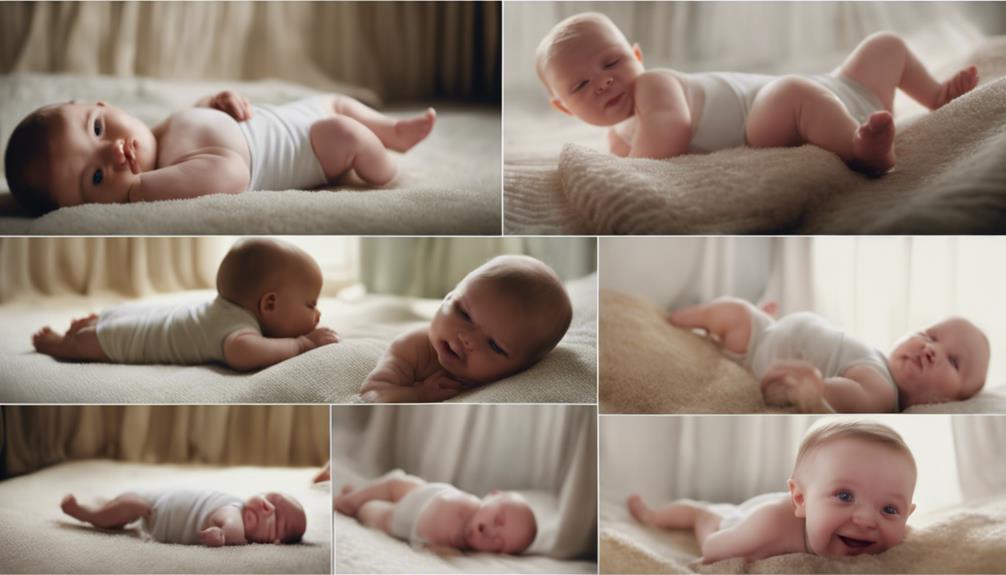
Developing rolling over skills in infants typically occurs around 4-6 months of age. This is one of the significant developmental milestones in a baby's motor skills journey. Initially, babies often start by rolling from their tummy to their back before mastering the more complex back to tummy movement. Encouraging proper arm positioning can aid in this process, helping infants gain the strength and coordination needed for successful rolling over. It's important to note that replicating the rolling motion may take time for babies to perfect, so patience is key. Providing plenty of floor time and space for practice can greatly assist infants in developing their rolling over skills effectively.
| Rolling Over Progress | Tips for Parents |
|---|---|
| Typically at 4-6 months | Encourage arm positioning |
| Start with tummy to back | Provide ample floor time |
| Master back to tummy | Be patient and supportive |
Sitting Up Achievements
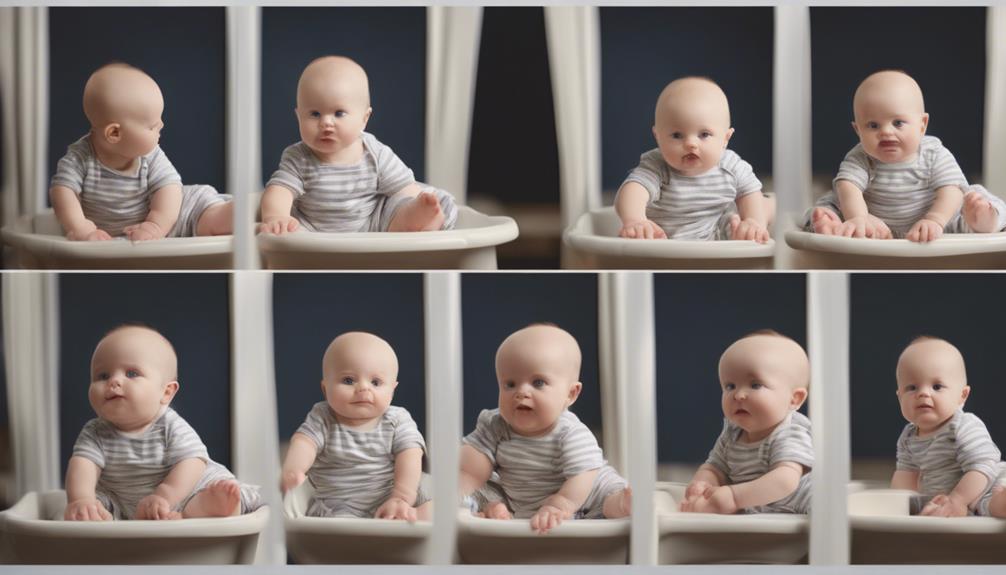
Achieving the milestone of sitting up typically occurs around 6 months of age for babies, marking an important step in their motor development journey.
Sitting up involves moving from a hunched position to an upright posture, which demands core strength and stability. To support your baby in this achievement, providing objects for them to grasp can help maintain their sitting position and engage their muscles effectively.
During practice, keeping your baby focused is vital to encourage concentration and further muscle development. Sitting up is a significant milestone as it sets the stage for the development of other motor skills like crawling and, eventually, walking.
Crawling Exploration
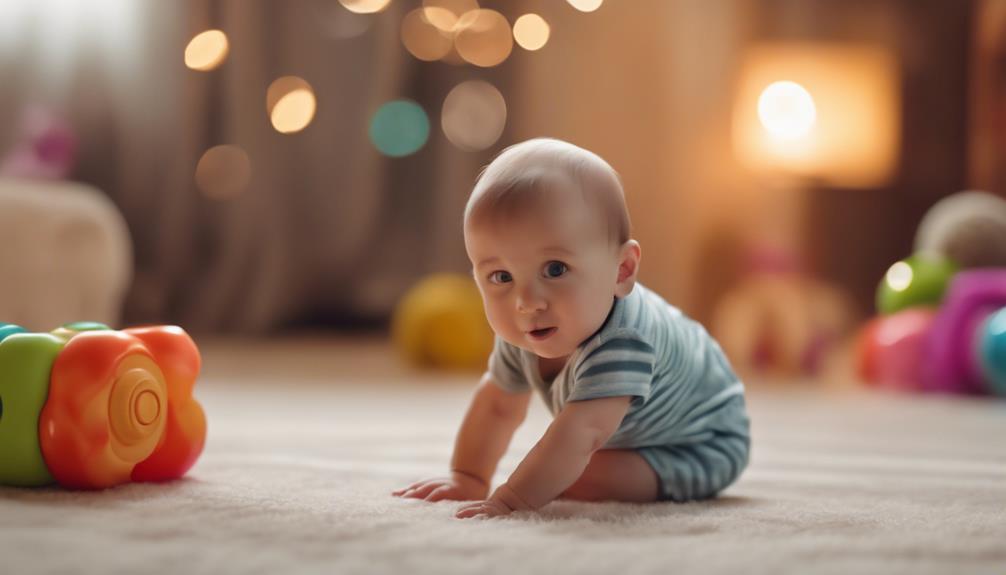
Around 7-10 months of age, infants typically engage in crawling exploration, a pivotal milestone in their gross motor development journey. Crawling involves the coordinated movement of arms and legs, fostering strength and balance.
While traditional crawling is common, some infants may choose to scoot or wriggle instead. To encourage crawling, placing enticing toys just out of reach can motivate infants to start exploring their surroundings.
By creating a safe and stimulating environment for play, parents can support their little ones in mastering this important skill. It's essential to give infants the freedom to move and explore at their own pace, as each child develops differently.
Through gentle encouragement and providing opportunities for exploration, you can help your baby build the strength and coordination needed for crawling. Celebrate each milestone achieved in your baby's motor development journey, knowing that each step, or crawl, brings them closer to greater independence.
Walking Independence
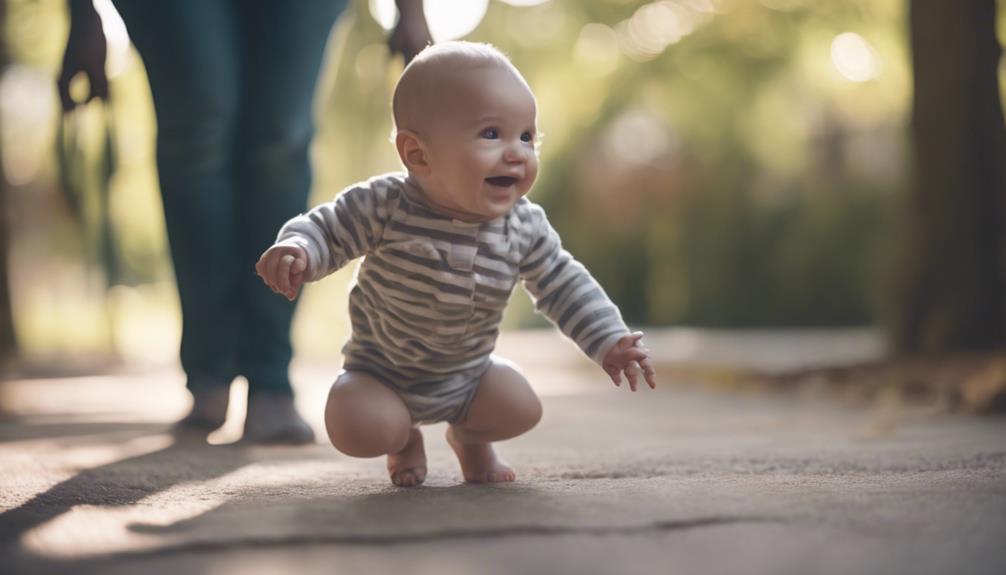
To support your infant's journey towards walking independence, create a safe environment that encourages exploration and movement.
Essential motor skills play a significant role in the development of walking independence, typically emerging between 10-12 months of age. Initially, infants may cruise around furniture before attempting unassisted steps.
Ensuring a safe environment and providing soft-soled shoes are vital steps in supporting early walking. Encouraging free play allows infants to develop balance and gait necessary for independent walking.
Placing toys or objects at slightly higher levels can motivate infants to stand and take steps towards them, further enhancing their gross motor skills.
Running and Beyond
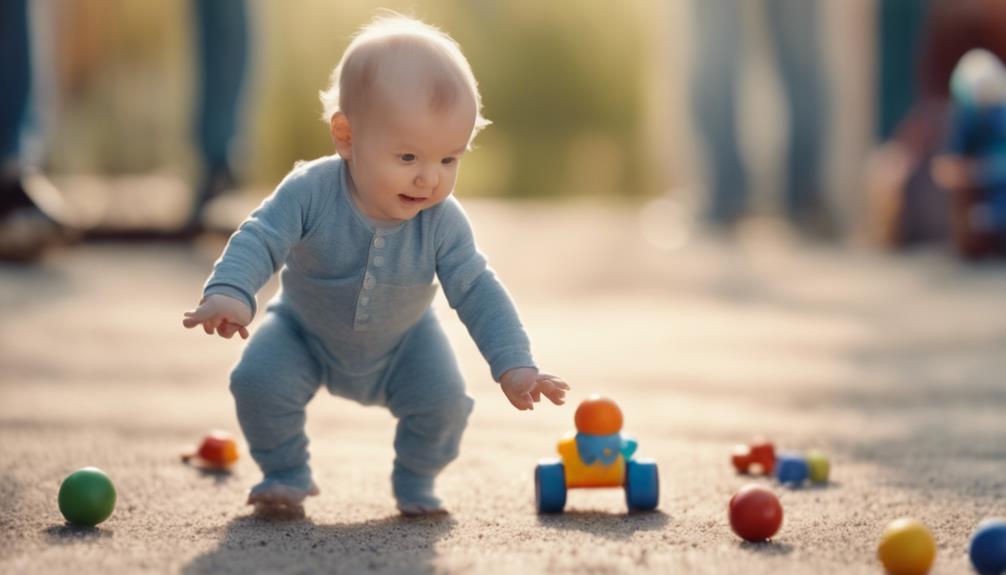
As your child develops more advanced gross motor skills, running typically emerges around 2-3 years old. Running plays an important role in strengthening your child's large muscles and enhancing their cardiovascular fitness. Providing a safe environment for them to practice running and other physical activities is essential to improve their coordination and balance. Encouraging outdoor play and active games can further promote running skills and overall physical development in children.
- Running helps build strength in leg muscles.
- Enhances cardiovascular fitness.
- Improves coordination and balance.
As children master running, they may progress to more complex movements like jumping, skipping, and playing sports, which further enhances their motor skills and physical capabilities. By nurturing these abilities through running and other physical activities, you're supporting your child's overall growth and development in a fun and engaging way.
Frequently Asked Questions
What Are the Stages of Motor Development in Infants?
You see motor development in infants progress through stages like pushing up, rolling over, sitting up, crawling, and walking. Supporting your baby with activities like tummy time and encouraging movement helps their development.
How Can a Parent Promote an Infants Motor Development?
To promote your infant's motor development, engage in daily tummy time for core strength, provide support for sitting up, encourage crawling with toys, offer safe opportunities for standing and cruising, and use soft-soled shoes for walking readiness.
What Are the Five Motor Skills?
To develop your baby's motor skills, focus on pushing up, rolling over, sitting up, crawling, and walking. These milestones occur at different stages in the first year of life. Support and encourage activities like tummy time for best growth.
Why Are Infant Motor Skill Milestones Important for Parents to Know?
Knowing infant motor skill milestones is essential for parents. They help track your child's progress, detect delays early, and provide timely support. Milestones like rolling over, sitting up, and walking indicate your baby's physical and cognitive development.
Conclusion
By understanding your baby's motor development milestones, you can track their progress and support their growth.
Did you know that on average, babies start crawling around 7-10 months old?
Keep encouraging your little one to reach these milestones while providing a safe and nurturing environment for them to explore and learn.
Remember, each baby develops at their own pace, so celebrate every step of their journey towards independence!

